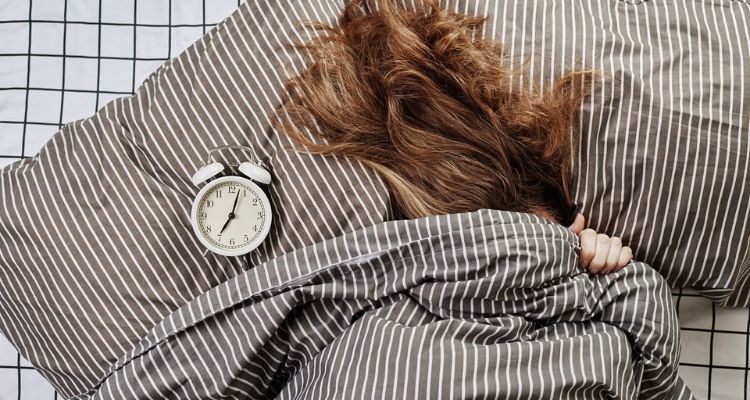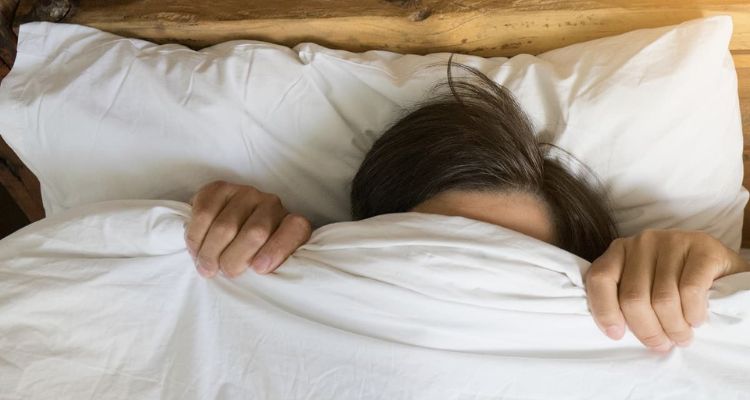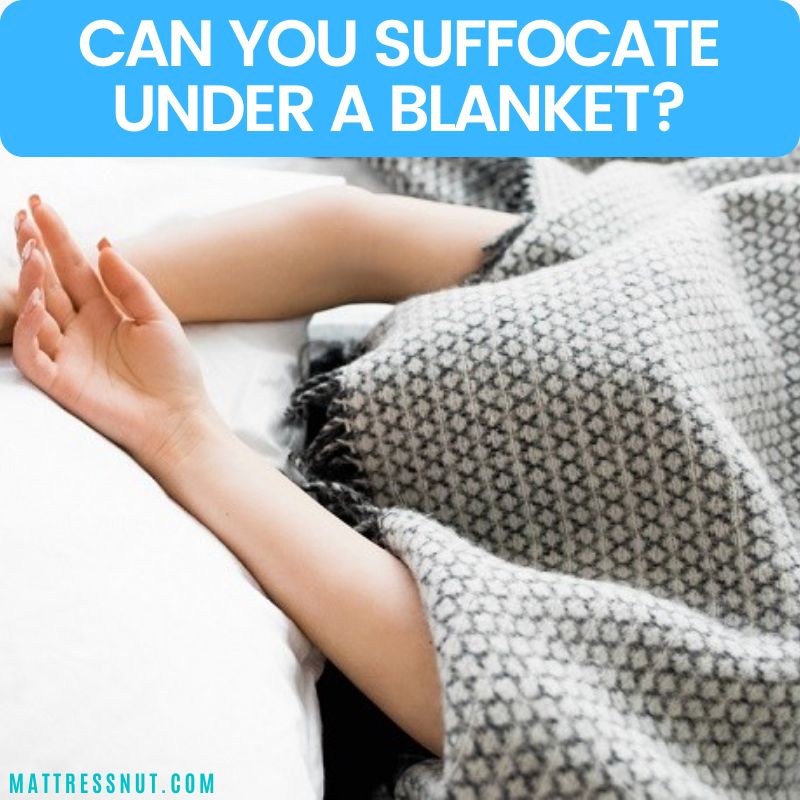It’s comfortable to sleep with a blanket over your head. However, many think it is not fit even though it has some benefits. Sleeping with the head covered can save your neck and keep bacteria away from your face at night.
Let’s find out all you need to know about sleeping under a blanket.
It’s In Human Nature to Cover During Sleep

Many people cover themselves with a blanket or even a pillow while they sleep, which is comforting and relaxing. However, this habit may harm specific body parts or overall health.
Covering your whole body, especially the head, can accumulate a high amount of Co2 near your face. It can increase your heart and respiratory rate levels and body temperatures. This habit should not continue on a long-term basis.
Here are a few reasons why to eliminate this habit.
Brain Damage:
Studies show that 23% of humans who sleep while covering their heads can develop a severe mental disorder called dementia. Dementia is a common neurodegenerative disorder. Prolonging this disorder may cause Alzheimer’s disease, which affects brain activeness.
Another reason is that it may decrease the airflow that passes to your brain through the nose and mouth, reducing the brain’s oxygen level. When the function of the brain does not work appropriately for long, it damages the tissues and vessels of the brain.
Unclean Air
The brain needs fresh air to function perfectly, even when you are sleeping. However, while you are covering your body underneath a blanket, you are not inhaling clean and natural air because of the layer you create.
So, if the blanket is not clean, you are inhaling dust, dirt, and bacteria. Because of this bad habit, some people might trigger allergies and make sleeping troublesome (also check the top rated mattresses for allergies).
Increase Carbon Dioxide Levels
The research results show that the oxygen concentration drops from 20.9% to 18%. In contrast, carbon dioxide concentration rises to 2% from 0.4% in one minute. As time passes, oxygen levels drop to 16.5%, increasing to 4.1% in carbon dioxide.
However, a long head covering may cause less oxygen to circulate to the brain and makes you feel light-headed.
Difficult To Fall Asleep
Covering your head may reduce the quality of your sleep, especially if you’re a hot sleeper. People may find it hard to fall asleep when they are feeling sweating and warm, which keeps them awake the rest of the night. If this habit continues, you may develop a common insomnia disorder or heart problems.
Suffocation Risk
Even though you may feel comfortable at night while covering your head; although, it has significant respiratory risks too. Having some underlying conditions, namely asthma, sleep apnea (check 8 amazing mattresses for sleep apnea), and cardiac disease, one of the risks you might have is suffocation.
People with these conditions, including lung disease, may be at higher risk of suffocation while covering their heads. All this is because you keep rebreathing the air, which circulates less oxygen in the body and harms mental health.
Sleep Apnea Risk
Other than insomnia, sleep apnea is a sleeping disorder. Typically, it occurs when a person feels difficult to breathe during sleep. The interrupted breathing pattern may cause people to snore and feel restless, even though they had a sound sleep at night.
The leading cause of sleep apnea is the quantity of air circulating in the body while sleeping with the head covered.
Pros of Sleeping with A Blanket Over Head
Warmer Head:
Sleeping at a warmer temperature may reduce the cause of illness. It is difficult to sleep if the weather is cold outside, so you should have to keep your head warm.
Sleeping under the blanket provides a barrier between your body and cold air, making your breathing circulate in the cover. Resulting in your whole-body feeling warmth, including your head too.

Neck Protection:
A covered head can decrease sleeping discomfort and protect your neck from several pain problems. This includes tissue injuries caused by over movement and muscular strain by bad posture. It provides a warm feeling near the neck. So, your neck is not vulnerable to cold air, thus making you sleep comfortably (also check 10 great pillows for neck and shoulder pain).
Block Light:
People sharing their room with partners or siblings may have difficulty sleeping on time due to lightness. They prefer not to sleep in a dark room or have unnecessary fears. So, covering your head with a duvet or blanket is an excellent option to block light for sleeping peacefully at night.
Helps In Insomnia:
Insomnia is a common sleeping disorder; many people don’t sleep relaxed throughout the night, which leads to anxiety, stress, and depression. However, you can reduce these issues by covering your whole body with a sheet at night.
Tips and Tricks for Sleeping with Your Head Under a Blanket
What You Do Before Sleep Is as Important as Sleep Itself
Sleeping is as essential as air. Avoid using electronics like mobile, laptops, and games before sleeping. Establish a healthy sleep routine and implement it properly. Don’t consume tea, coffee, chocolate, and medications at least 6 hours before sleeping as they contain caffeine, which may affect sleep quality.
Try making a habit of reading books, meditating, and having a relaxing massage before sleeping; it will make your body feel relaxed. Above all, taking at least 7-8 hours of cozy sleep is recommended at night.
Try Using a Silk Pillowcase
A silk pillowcase is softer and smooth in texture than a cotton pillowcase. These pillowcases reduce the resistance between your face and fabric so that they won’t irritate your skin.
Sensitive skin people prefer to use these pillowcases as they are gentle on the skin and reduce the risk of skin diseases like acne, redness, and inflammation. Silk pillowcases are beneficial for hair and prevent hair from fizziness, tangles, and excessive damage.
Sleeping Under a Blanket Is Best Done by Sleeping on Your Back
Back or side position, neither of these positions are bad for sleeping under a blanket. However, the back position is much better as it helps maintain your complete body alignment, which can further lead to good breathing. It is highly required under blanket covers to avoid the risk of suffocation.
Cut Small Holes in Your Blanket to Let Your Face Breath
Sleeping under the blanket while covering your face overnight may cause suffocation and disturb your sleep. It can develop other sleep disorders like sleep apnea and insomnia.
Moreover, the air circulates inside our body, increasing the concentration of carbon dioxide, which is harmful to the respiratory system. Cutting the small holes on the blanket allows the fresh air to circulate while sleeping. The only issue is that it might look weird, but people should not compromise their health.
Alternatives To Sleeping With A Blanket Over Our Head
Sleeping Mask
One of the best options to consider other than a blanket is sleeping masks. If you have light-sensitive issues, you can block the light by wearing them at night. These masks cover your eye and forehead area entirely, which helps to block the room light and sunlight.
Pros:
- The primary reason for these masks is to improve sleep quality.
- These masks are much cheaper and cost-effective than a duvet or blanket.
- Protect the eyes from allergies like redness and watery, which may cause by an unclean blanket.
Cons:
- Breakage of eyelashes.
Camping Pillow:
Camping pillows are significantly designed for camping and are smaller than a standard pillow. These pillows are compact and lightweight and give good support to the neck and head by placing the head inside their special partition. In addition, the soft and squishy fabric of these pillows makes sleeping comfortably at night (also check 10 top rated pillows with great comfort).
Pros:
- These pillows help block out the incoming light.
- The comfy and fluffy material of these pillows won’t scratch your face.
- These pillows are foldable.
Cons:
- A bit expensive.
Why Should You Not Cover Your Head While Sleeping?
It is not healthy to cover your head while sleeping. Several factors can cause serious health issues, like brain damage and heart issues. The prolonged healing of carbon dioxide may cause tiredness, dizziness, increased heart rate, and leads to coma.
Respiratory problems include lung damage, and suffocation can disturb your sleep. Furthermore, dust particles may cause bacteria on the skin. As a result, you may have skin allergies or rashes.
Key Takeaways: Understanding the Risks of Sleeping Under a Blanket
Human Inclination to Seek Comfort
Many find solace in sleeping with a blanket over their heads. However, this comforting act could jeopardize one’s health due to the accumulation of CO2, affecting heart and respiratory rates.
Potential Harm to Brain Health
A concerning link exists between head-covering during sleep and the development of dementia. Reduced airflow and oxygen to the brain can lead to significant damage to its tissues and vessels.
Exposure to Unclean Air
Trapped beneath a blanket, one might inhale pollutants like dust, dirt, and bacteria, raising the risk of allergies and reducing the quality of sleep.
Rising Carbon Dioxide Levels
The act increases carbon dioxide concentration around the face. Over time, this can lead to feelings of lightheadedness and decreased oxygen to the brain.
Addressing Other Health Concerns
Covering the head while sleeping can impede quality sleep, especially for warmer individuals. It also raises suffocation risks, particularly for those with conditions like asthma and sleep apnea.
Recognizing the Benefits
Sleeping under a blanket can offer warmth against the cold, safeguard the neck from discomfort, block out light for the light-sensitive, and even aid some insomniacs.
Safe Practices for Blanket Lovers
For those keen on continuing the habit, it’s essential to embrace safer practices, like using silk pillowcases, adopting a back-sleeping posture, and making small holes in the blanket to improve air circulation.
Exploring Safer Alternatives
Considering potential risks, alternatives like sleeping masks and camping pillows can offer the comfort of a blanket without many of its drawbacks.
Conclusion:
People prefer to sleep with a blanket to cover their heads, as it is a soothing experience. However, while protecting the head with a sheet has many benefits, it has some risks too, and suffocation is one of them. Less oxygen level in the brain makes people faint and leads to severe mental disorders. You may encounter other issues like increased heart rate and lungs problem.
Furthermore, sweating makes people sleep uncomfortable. Although, it is a personal preference to cover your head or not while sleeping. People should consider alternative ways like sleeping masks and have some knowledge about tips and tricks to avoid such risks.
Blanket & Suffocation FAQs
Can A Child Suffocate from Sleeping Under the Cover?
Generally, blankets are harmless, but it is not safe for children to sleep under the blanket during bedtime. Anything that can cover their nose and mouth could increase the risk of suffocation and disturb their sleep.
The safe guideline issued by the American Association of Paediatrics (AAP) includes a strong recommendation not to cover the child's head at night.
What Happens If You Fall Asleep Under a Blanket?
Falling asleep under a comfy and soft blanket makes our body warm and protects us from cold weather. It can save us from surrounding light and noise, too. But sleeping in this state for a long time causes dementia and suffocation, which are dangerous to your health.
Why Do We Feel Safer Under the Blankets?
Because it is our nature to cover our body during sleeping at night, it makes us feel secure and protected. It further protects us from unnecessary fears while sleeping in a dark room or alone.

